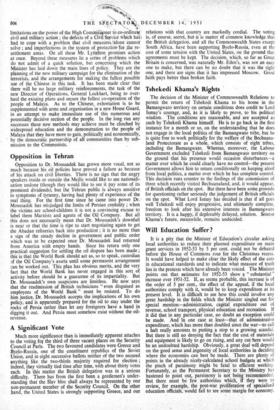Will Education Suffer?
It is a pity that the Minister of Education's circular asking local authorities to reduce their planned expenditure on main grant services in 1952-53 by 5 per cent. could not be debated before the House of Commons rose for the Christmas recess. It would have helped to make clear the likely effect of the cuts in educational standards and to indicate what measure of truth lies in the protests which have already been voiced. The Minister points out that estimates for 1952-53 show a " substantial " increase over 1951-52. If, as seems probable, this increase is of the order of 5 per cent., the effect of the appeal, if the local authorities comply with it, would be to keep expenditure at its present level. It is difficult to see how this could involve any great hardship in the fields which the Minister singled out for special mention—administration, capital. expenditure out of revenue, school transport, physical education and recreation. If it did that in any particular case, no doubt an exception could be made. And in one case at least—that of administrative expenditure, which has more than doubled since the war—to call a halt really amounts to putting a stop to a growing scandal. But there is still no denying the fact that the cost of materials and equipment is likely to go on rising, and any cut-here would be an undoubted hardship. Obviously, a great deal will depend on the good sense and ingenuity of local authorities in deciding where the economies can best be made. There are plenty of points in the already nicely-calculated school budgets at which the pinch of parsimony might be fatal to efficient working. Fortunately, as the Permanent Secretary to the Ministry has hastened to point out, parsimony is not being recommended. But there must be few authorities which, if they were to review, for example, the post-war proliferation of specialised education officials, would fail to see some margin for economy.






































 Previous page
Previous page